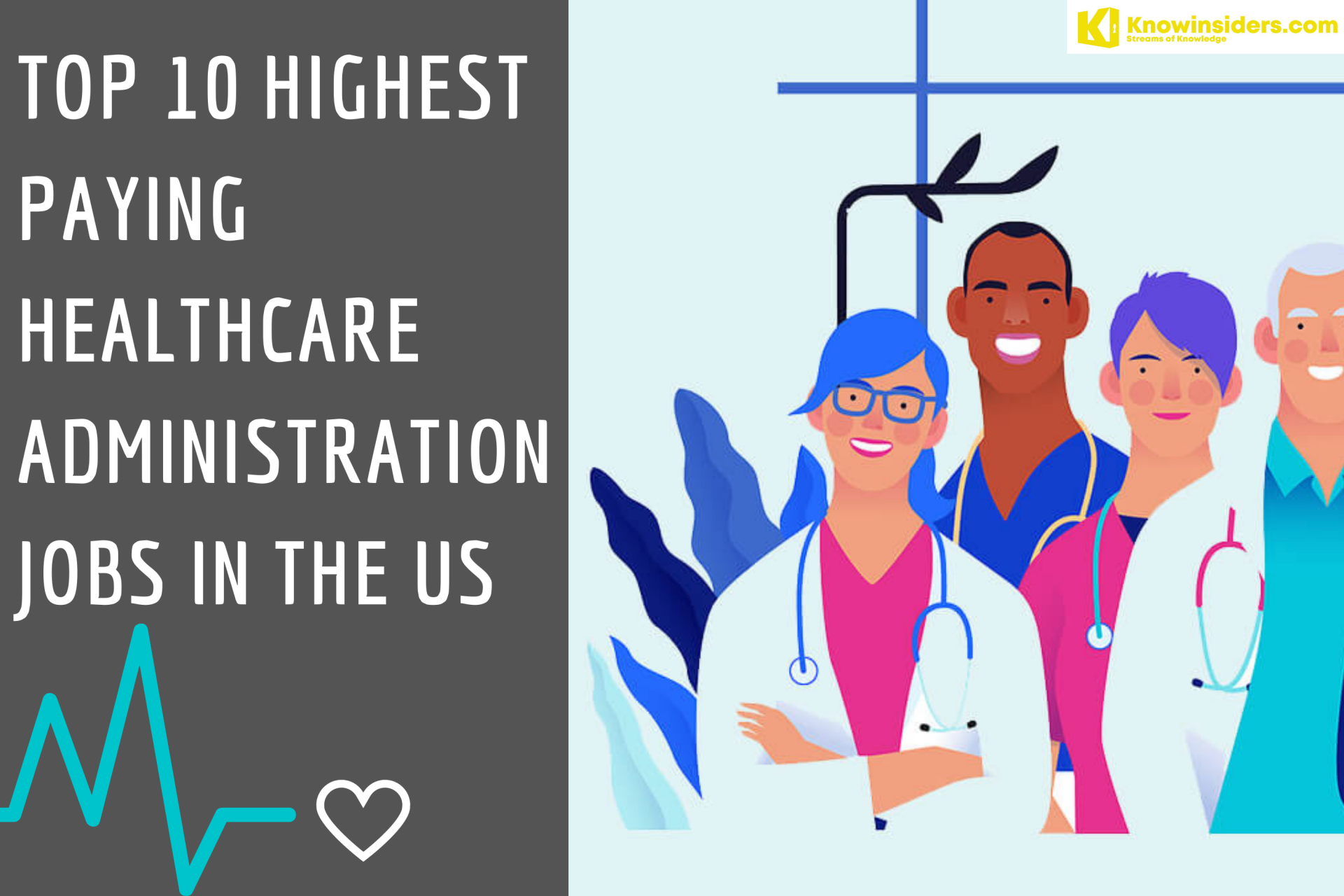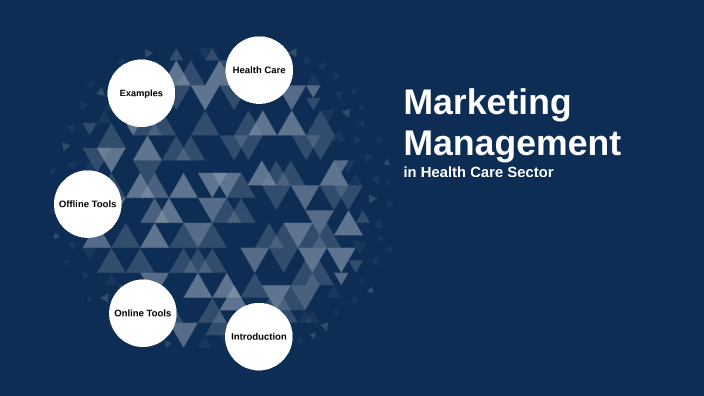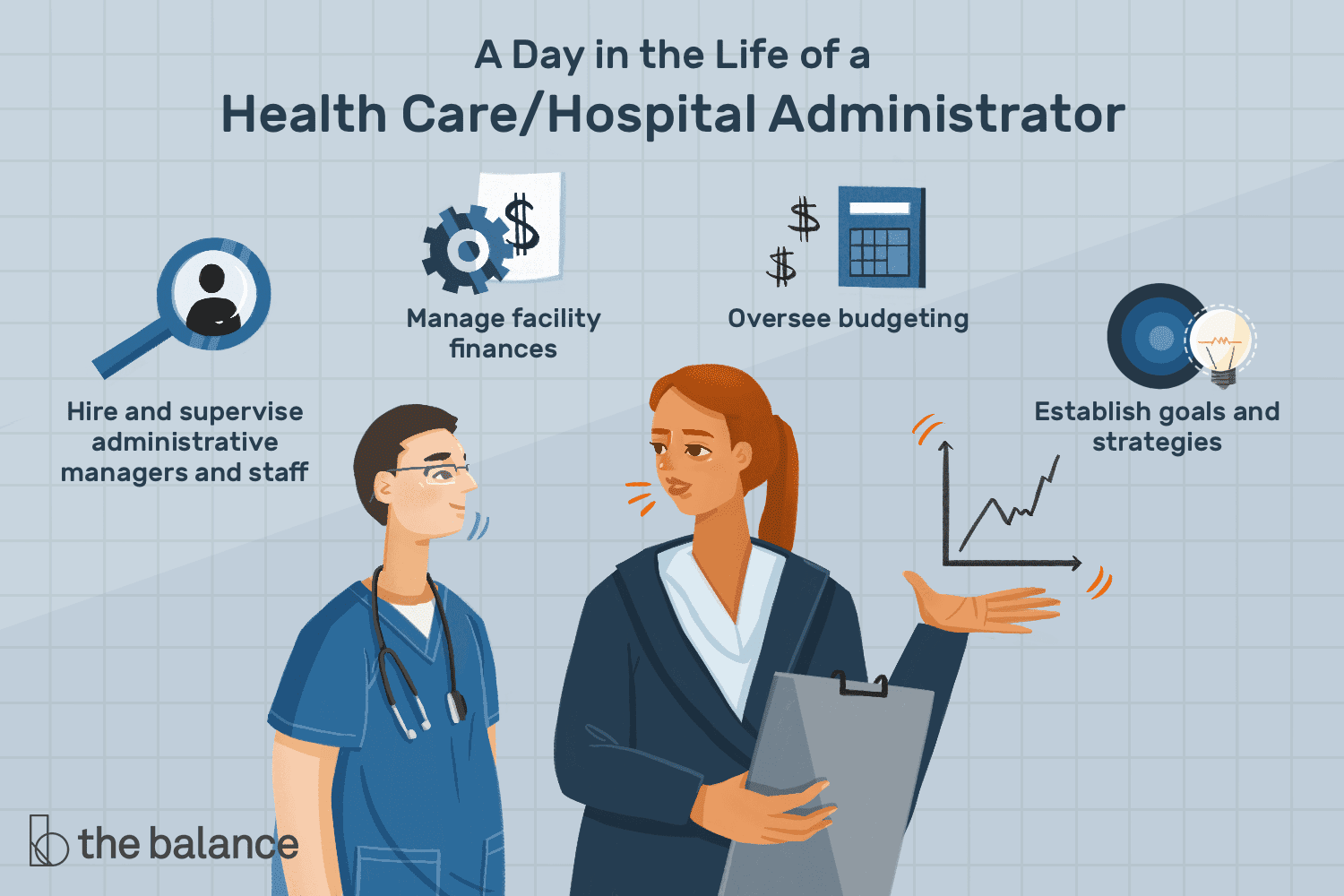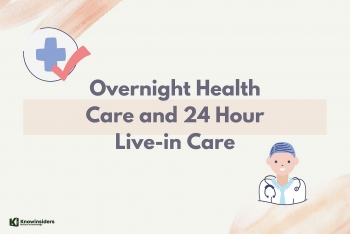10 Highest-Paying Healthcare Administration Jobs In The US Today
 |
| Top 10 Highest Paying Healthcare Administration Jobs In The US |
| Contents |
In addition, we are now living in a time when technologically-driven practices and medical innovations are revolutionizing the healthcare system. However, the demands placed on our healthcare system are at an all-time high.
Our healthcare system is being tested like never before, and with such complex problems comes an ever-increasing demand for highly trained doctors, nurses, and allied health professionals.
Healthcare is one of the most stable and reliable industries, with job growth and advancement opportunities pretty much guaranteed, whether your goals are to provide care at the bedside, manage healthcare teams, or make decisions at the systems level.
If you're in the market for a high-paying healthcare position right now, we've highlighted the top 10 highest-paying health care management jobs in the United States.
What is a Healthcare Administration Career?
There are many career options and paths in the broad field of healthcare administration. Let's define healthcare administration and look at some of the jobs available within it before we get into the highest-paying positions.
People who are involved in making decisions regarding the operational plans of a healthcare system fall under the umbrella of healthcare administration, also known as health administration or medical administration. These are the individuals who are in charge of, or actively engaged in, organizing, directing, and coordinating the commercial operations of healthcare organizations or providers.
With such a broad definition, it makes sense that there are so many different career options within it.
Healthcare in the United States
No universal healthcare system exists
Health benefits are not offered to residents or guests of the United States by the government. Every time you receive medical attention, someone has to foot the bill.
Health care is very costly
A $7,500 bill could result from breaking your leg, according to a U.S. government website. It would likely cost around $30,000 to stay in the hospital for three days.
The majority of Americans have health insurance
If you get sick or hurt, having health insurance keeps you from having to pay a lot of money to hospitals or doctors. You must pay a health insurance provider on a regular basis (referred to as "premiums") in order to receive health insurance. In return, the business agrees to cover all or a portion of your medical expenses.
The majority of your medical care will come from your "primary care provider" (PCP)
You can select a PCP who is a part of the network of your insurance provider after purchasing health insurance. You can select a PCP at MIT Medical if you purchase an MIT health insurance plan. Your new PCP might be a doctor or a nurse practitioner. When you require a physical examination or lab test, are ill, or require care for an ongoing condition like diabetes or high blood pressure, you should see your PCP.
To see a doctor, you will typically need an appointment
Make an appointment with your PCP by calling their office if you want to see them. You must be able to articulate your need for the appointment when you call. You will soon receive an appointment if you are ill or hurt. You might have to wait a few weeks or even a month if all you need is a routine physical.
Healthcare average salary in the USA
In the United States, an individual working in the health and medical fields typically makes around 141,000 USD annually. From 29,600 USD (the lowest average) to 423,000 USD (the highest average, though the actual maximum salary is higher), salaries are paid.
This represents the typical annual salary after housing, transportation, and other benefits. The pay for various health and medical careers varies greatly. See the salaries for particular job titles below if you're curious about the pay for a particular position.
In the United States, the average healthcare salary is $57,155 annually. To view healthcare salaries in your area, use the location filter. Salary estimates are based on 332 anonymous salaries submitted by Healthcare employees to Glassdoor.
In the United States, the highest annual healthcare salary is $107,447.
In the US, $30,403 annually is the lowest healthcare salary.
Top 10 Highest Paying Healthcare Administration Jobs In The US
1. Nursing home administrator
 |
| Photo: medbest |
A nursing home administrator's main responsibility is overseeing the residents of the facility. A nursing home administrator has a few extra duties that are unique to nursing homes because they are so much more than just healthcare facilities. In general, they ensure that all of the patient's healthcare requirements are satisfied and that they have a positive experience. They accomplish this by managing nursing services and ensuring that the residents receive top-notch medical care, nourishing meals, and enjoyable activities. They also manage the nursing home's finances and other divisions.
Job prospects & salary
Depending on their level of experience, nursing home administrators receive varying salaries. The entry-level salary for this position is $74,435, and the average annual salary is $92,762, according to PayScale. The average salary for nursing home administrators with more than 10 years of experience is $101,477. According to the BLS, employment opportunities for nursing home administrators are predicted to increase 17% by 2024.
2. Health care marketing manager
 |
| Photo: prezi |
Both healthcare and marketing strategy expertise are required of a healthcare marketing manager. These managers assist their clients (typically doctors, health insurance providers, hospitals, etc.) in informing their patients about healthcare programs through their marketing strategies and techniques. The fact that there is a client (the healthcare provider), a target market (patients), and a product (healthcare) is really the only difference between a healthcare marketing manager and a traditional marketing manager.
Job prospects & salary
The average annual wage for a healthcare marketing manager, according to PayScale data, is $75,000, while the BLS projects a 6% job growth rate for marketing managers overall by 2029.
3. Chief nursing officer
 |
| Photo: norwich.edu |
The chief nursing officer, who is also known as a director of nursing, is in charge of managing an entire nursing department. The pay for this senior leadership position is by far the highest you'll find in the nursing industry. CNOs typically have an MSN or MHA.
According to 2019 BLS statistics, top executives in the healthcare sector, including CNOs, made a median salary of $166,410, ranking them in the middle of the pay scale for executives at this level across all industries:
Job prospects & salary
The average annual wage for a chief nursing officer, according to PayScale, is $135,781. Depending on the years of experience, the location, and other elements, this number varies. According to the BLS, the employment outlook for chief nursing officers is expected to increase by 22%.
4. Health information technology specialist
 |
| Photo: prezi |
This is a new profession. It might have developed from an earlier profession or may have arisen in response to a change in consumer demand or a development in technology.
Health information technology (HIT) specialists typically work with information technology (IT) and software that is related to the healthcare industry. Health-related records, databases, and information can be collected, managed, and displayed with the help of this technology.
Applications for health information can raise the standard of care offered by hospitals and clinics. Additionally, they can provide records that may be required in legal proceedings and lower administrative costs.
Job prospects & salary
The average yearly wage for a health information technology specialist is $67,437, according to Glassdoor. By 2028, this position's employment outlook is predicted to grow by 11%, per the BLS.
5. Assisted living administrator
 |
| Photo: relias |
Administrators for assisted living facilities, which resemble nursing homes in some ways, work in these facilities. Elderly residents are served by nursing homes and assisted living facilities by way of a safe environment, support services, medication management, social activities, and meal preparation. However, the most important distinctions between nursing homes and assisted living facilities are found in the latter's structural design and medical offerings.
Nursing homes offer 24-hour medical attention and supervision. This might imply that there are speech pathologists, specialized nurses, respiratory experts, or physical therapists on staff. Because of this, a nursing home may look more institutional than an assisted living community and may resemble a hospital, where residents occasionally share rooms and are taken care of by full-time medical staff.
For senior citizens, assisted living facilities offer a community living setting, and the staff is better trained to handle minor, less serious problems like memory loss and impaired mobility. As a result, resident life is more community-focused and empowering for the residents, who frequently have their own suites, a sense of strong agency in their daily lives, and access to help whenever they need it.
Job prospects & salary
Administrators of assisted living facilities make, on average, $60,270 per year, according to PayScale. All healthcare service managers, including administrators of assisted living, are expected to see a 20% increase in employment, according to the BLS.
6. Consulting healthcare administrator
 |
| Photo: online.maryville.edu |
As a healthcare consultant, you must identify operational inefficiencies. Thus, a healthcare consultant advises companies on how to cut costs and boost revenue. This means working with medical facility administrators to identify problems and propose solutions. Healthcare consultants must evaluate and design efficient systems and procedures. This career involves programming analysis and management consulting. Consultants need excellent oral and written communication skills, a pleasant demeanor, and reliability. Healthcare consultants can work independently or as in-house consultants and analysts.
Healthcare consultants work with C-suite executives, nurses, and doctors. Thus, a healthcare consultant needs industry experience and medical training. Medical training is not always required. MBA-educated healthcare consultants succeed. Certified management consultants (CMCs) may improve job prospects. Healthcare consultants need critical thinking, math, and judgment. Healthcare consultants average $95,688 annually.
Job prospects & salary
According to the BLS, the average annual salary for this position is $96,540, with a 24% projected job growth by 2024.
7. Healthcare quality improvement manager
 |
| Photo: hopkinsmedicine |
Quality improvement managers update policies and procedures. Process improvement or quality management programs must be successful. They set work plan metrics and collect data for accurate trending reports. They may analyze top diagnoses, clinical procedures, and operational performance metrics to recommend effective solutions. They may prioritize clinical prioritization, service quality, provider feedback, and improvement.
Quality directors, committees, and workgroups can help quality improvement managers achieve goals. Service contracts, staff education, and accreditation may determine these. Quality improvement managers can be knowledge experts for clinical, functional, and administrative continuous improvement. They monitor care complaints and medical record assessments to identify risks and recommend solutions. They review clinical quality studies, trended industry data, national benchmark assessments, and best practices monthly.
Job prospects & salary
According to ZipRecruiter, a healthcare quality improvement specialist’s average annual salary is $63,311. Employment regarding this position is expected to grow 18% by 2028, as projected by Zippia.
8. Hospital administrator
 |
| Photo: thebalancecareers |
Hospital administrators manage health services and hospital operations. The healthcare administrator manages the budget, hires, fires, and trains staff, acts as a liaison between departments to ensure quality control and the best patient care, and works with IT technicians to ensure that healthcare technology safely protects patient privacy.
Manage the budget, sterilize equipment, evaluate staff, ensure HIPPA compliance, train staff, coordinate services with the hospital board and other regulating authorities, document patient visits, and more. A hospital administrator should have a bachelor's degree in healthcare administration, CPR certification, and knowledge of HIPAA and other coding regulations. Excellent oral and written communication, multitasking, planning, critical thinking, problem-solving, and management experience are needed to be a great healthcare administrator.
Job prospects & salary
According to PayScale, a hospital administrator makes on average $87,351 annually. As was the case with most healthcare managers in the BLS data, employment for this position is expected to grow 32% by 2030.
9. Medical coding specialist
 |
| Photo: womenonbusiness |
Medical coders are in charge of converting doctors' reports into practical, standardized medical codes. These experts perform their work in the background in a variety of settings, making sure that all relevant data is correctly coded to guarantee accuracy and consistency.
The insurance company or government provider needs to know what was done after a medical provider examines or treats a patient in order to process the bill. Because the common language used to describe medical procedures is too imprecise to provide the insurance company with the precise information it requires, a set of precise codes has been created. It is the responsibility of the medical coder to convey this knowledge in a clear and effective manner.
Job prospects & salary
According to Glassdoor, the average annual salary for a medical coding specialist is $43,138, whereas BLS projects an average (8%) job outlook.
10. Health Clinic Administrator
 |
| Photo: healthcareadministrationjobs |
Managers or supervisors are other terms for clinical administrators in a medical setting. They have a long list of duties, some of which include hiring and training employees. Additionally, they will have to schedule their employees' time and conduct meetings. Making employee schedules, holding staff meetings, and hiring and training new hires are a few of these duties.
Along with making sure the appropriate policies are followed, you will also be in charge of facility maintenance. Along with using different marketing strategies, overseeing the billing is also crucial. The scope of your duties will vary depending on the clinic you work for, but one thing is for sure—if you want to pursue this position, you will have some very significant obligations.
Job prospects & salary
The size, location, specialty, and size of the clinic that the administrator is managing will all have a significant impact on the administrator's pay. (A clinic providing low-income services, for instance, might not pay as well as a clinic offering plastic surgery, for instance.) We can use the BLS average salary of $96K for an administrative services manager as a benchmark for this position.
 How to Enroll ACA Health Insurance 2022 After Deadline How to Enroll ACA Health Insurance 2022 After Deadline Open enrollment for 2022 ACA health coverage started nationwide on November 1 via HealthCare.gov. In most states, it will end on January 15, 2022. |
 What is the Difference Between Overnight HealthCare and 24 Hour Live-in Care? What is the Difference Between Overnight HealthCare and 24 Hour Live-in Care? Are you considering around-the-clock home care for yourself or a loved one? Check out this article to know more about overnight health care and 24-hour ... |
 10 Highest Paying Jobs in the UK: Healthcare Dominate 10 Highest Paying Jobs in the UK: Healthcare Dominate Are you looking for high-paid jobs? Which are the Highest Paying Jobs in the UK? |























